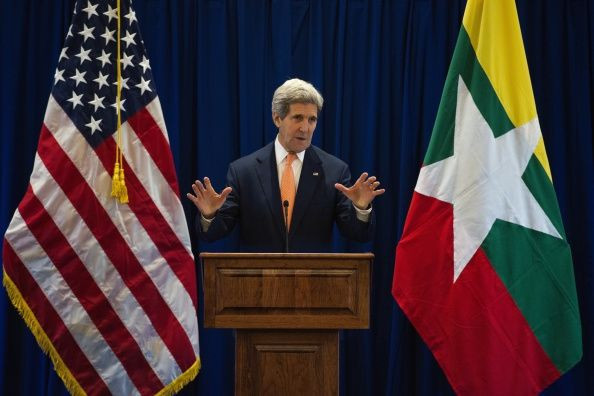Myanmar Sanctions: US Plans Policy Changes To Aid Business

The United States plans to renew the bulk of its sanctions against Myanmar when they expire next week, but will make some changes aimed at boosting investment and trade, according to several senior U.S. officials and congressional aides.
An announcement on extending much of the International Emergency Economic Powers Act, or IEEPA, could come as soon as Tuesday ahead of a visit to the Southeast Asian nation by Secretary of State John Kerry on May 22, officials said.
The U.S. Treasury Department has significantly eased sanctions against Myanmar by issuing general licenses that give companies and investors exemptions to sanctions targeting more than 100 individuals and businesses, including some of Myanmar’s biggest business players.
U.S. officials began lifting trade and financial sanctions against the country after military leaders launched reforms that led to a civilian government being formed in 2011, beginning its transformation from a half-century as an international pariah.
In December, Treasury temporarily relaxed trade restrictions on the country also known as Burma by allowing all shipments to go through its ports and airports for six months.
This time, Washington will likely offer more general licenses to specific companies, and take some people off Treasury's list of "Specially Designated Individuals" targeted for sanctions, congressional aides and U.S. officials said.
Kerry's visit to Myanmar is his first since the party of Aung San Suu Kyi, the country's Nobel laureate, swept to power following a landslide election win in November. A constitution drafted by the country's former military rulers bars her from becoming president.
President Barack Obama's opening to Myanmar followed by its peaceful transition to an elected government is seen as one of his foreign policy achievements. He has visited there twice. But the administration also wants to maintain leverage on the country to guard against backsliding on reforms and to press for improvement on human rights.
By renewing the legal framework for sanctions even as it eases some measures, Obama will offer the private sector more breathing room while maintaining pressure on its military, which still holds significant political power. The sanctions had been due to expire on May 20.
Washington has deep concerns about human rights conditions in predominantly Buddhist Myanmar, especially violence against ethnic and religious minorities including Rohingya Muslims.
'ROAD TO DEMOCRACY'
Members of the U.S. Congress, from both parties, are watching closely and could move to clamp down on Myanmar themselves if they think Obama is moving too quickly.
Last month, Senators Cory Gardner and Ben Cardin, the Republican and Democratic leaders of the Foreign Relations Asia subcommittee, wrote to Kerry and Treasury Secretary Jack Lew expressing concern about rights, and asking the administration to work with Congress to ensure those concerns were addressed.
"Like you, we want to ensure that the U.S. is Burma's strongest supporter on its road to democracy," the senators said in the letter, seen by Reuters.
U.S. officials, speaking on condition of anonymity, said Aung San Suu Kyi supported the extension of U.S. sanctions with some changes. Discussions with her have focused on how to properly target trade restrictions so they do not hurt Myanmar's overall economy, but keep pressure on military-owned institutions, they said.
"We are looking to take steps to demonstrate our support for the new democratically elected government of Burma ...and that we're taking the necessary steps to ensure that they succeed, that they can carry on economic developments and reforms," a senior administration official told Reuters.
"At the same time we want to do that in a smart, measured way that gives us a range of options and flexibility to respond appropriately going forward," the official added.
The United States is eager to expand relations with Myanmar to help counteract China's rise in Asia and take advantage of the opening of one of the world's last "frontier markets," growing but less developed emerging economies.
Peter Kucik, a former senior sanctions adviser at the U.S. Treasury, said despite an easing of some banking sanctions by the United States since 2012, transactions with Myanmar were still difficult.
"I suspect the changes that get announced all drive at the same end goal: which is to promote and make easier the trade and business relationships between the two countries and encourage continued reform while minding concerns," said Kucik.
"The details will really indicate where the principal areas of remaining concern are but broadly speaking they are going to be aligned with what we've seen so far," he said.
© Copyright Thomson Reuters 2024. All rights reserved.





















